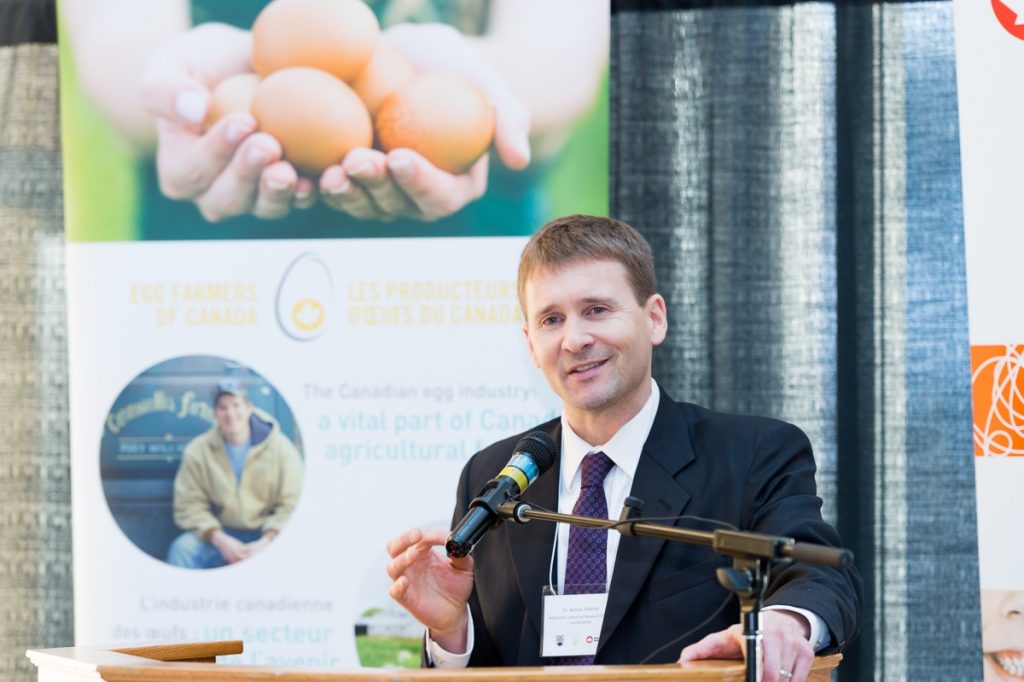
Green Eggs: Sustainable intensification
By Nathan Pelletier
Features Layers Production annex Canada Efficiency Egg production Green eggs Research Sustainability “Over the past 50 years, egg production in Canada has increased 50 per cent, while the overall environmental footprint of the industry has decreased a commensurate amount.”
“Over the past 50 years, egg production in Canada has increased 50 per cent, while the overall environmental footprint of the industry has decreased a commensurate amount.” Sustainability, in the broadest sense, simply refers to maintaining the conditions necessary to our well-being. This clearly includes a healthy environment – for example, clean air, clean water, fertile soil and a stable climate. It also includes healthy societies and communities, in which we have opportunities to pursue what we understand to be a good life. And, importantly, it requires healthy economies.
Societal attention to the relationships between food and sustainability has skyrocketed in recent years. This trend speaks to a growing collective awareness of the pressing nature of the many sustainability challenges we face, such as climate change, nutrient pollution, and increasing competition for land, water and energy resources. It also reflects the central role of modern agri-food systems in contributing both to these challenges as well as to their potential solutions.
Sustainable intensification in agriculture is the process whereby we progress towards producing more with less – in other words, producing more food using fewer resources and generating less waste. This requires highly efficient, ecologically integrated and economically viable food production technologies and practices.
The on-going sustainable intensification of agriculture provides a critical piece of the challenging puzzle of how to sustainably feed a growing world population, which may reach 9.4 billion people by mid-century and close to 12 billion by century’s end.
The Canadian egg industry, supported by value chain partners, has demonstrated an impressive track record of sustainable intensification to date. Over the past 50 years, egg production in Canada has increased 50 per cent, while the overall environmental footprint of the industry has decreased a commensurate amount. Thanks to improvements in farm management, hen health, feed conversion and rate of lay, as well efficiency improvements all along the supply chains that support egg production (for example, more efficient fertilizer and crop production for poultry feeds), the industry now produces much more while using much less.
The question and the challenge that presents itself is whether and how the industry can maintain and even enhance this trajectory of sustainable intensification looking forward. The NSERC/Egg Farmers of Canada Industrial Research Chair in Sustainability, housed in the Food Systems Priority Research for Integrated Sustainability Management (PRISM) Lab at the University of British Columbia Okanagan, has been established to support this very objective.
With combined egg industry and federal funding provided through this chair, the Food Systems PRISM Lab will work closely with Canadian egg farmers and their value chain partners on a range of sustainable intensification initiatives. This includes, for example: identification of sustainability best management practices; evaluation of current and emerging sustainable intensification technologies along the supply chain; and development of regionally specific technology deployment decision support tools.
The PRISM Lab is also developing the Canadian Agri-food Life Cycle Data Centre (CALDC). The CALDC will enable sharing information and data amongst Canadian agri-food industry participants in support of transparent, credible and reproducible sustainability measurement and management initiatives.
The PRISM Lab is actively seeking research partnerships and opportunities to collaborate with egg farmers, allied industry partners, researchers and other stakeholders. Working together today, we can create the success story of tomorrow! Interested parties should contact me. For more information, please visit: prismlab.weebly.com.
I, along with my graduate students, look forward to providing regular updates in this new quarterly “Green Eggs” column.
Nathan Pelletier is Egg Farmers of Canada’s industrial research chair in sustainability, from the University of British Columbia – Okanagan.
Print this page